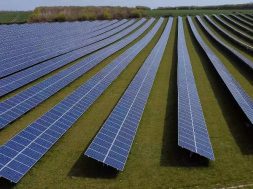
Taiwan’s Solar Companies Cut Work Days and Production to Prepare for Market Downturn
The latest changes in China’s solar policies and feed-in tariff scheme have severely impacted the operations of photovoltaic (PV) product manufacturers located in Taiwan. Following the announcement by the island’s PV cell supplier Motech Industries Inc. to temporarily shut down its solar wafer production plant in Tainan’s Southern Taiwan Science Park, another local wafer supplier Green Energy Technology Inc. (GET) also said that it is going to adjust the work schedule of its employees due to a freeze in incoming orders. According to GET’s statement, some of its employees will now have to take two days off for every two work days. This change is supposed to be an interim measure to protect the rights of workers, and the company hopes that it will eventually reintroduce the original schedule of two days off for every four work days.
However, sources inside GET told the island’s newspaper Apple Daily that the company had begun laying off people at the start of this year and suddenly introduced the new schedule at the end of May without any warnings. The monthly salary from the company has been reduced by around TWD 10,000 under the new schedule, and there is no overtime. The sources also told the newspaper that the company has not said when it will bring back the old schedule. Furthermore, the management has arbitrarily transferred numerous workers from their original departments to different ones. There are now complaints that GET is in effect imposing a furlough or forcing some of its employees to quit on their own.
Responding to these criticisms, GET said that the recent adjustments in its human resource management are a sincere attempt to protect the rights and livelihood of its workers while facing a depressed solar market. The company also stated that its new schedule is a temporary solution and in compliance with the local labor code. The company moreover emphasized that it has not initiated a furlough. Christine Chen, GET’s spokesperson on this matter, pointed out that her company is rearranging the processing of orders to help its employees get through this difficult period. Chen expects that the original work schedule will be restored when the market outlook becomes brighter.
Despite GET’s assurances, the department of labor in the city of Taoyuan, where the company is headquartered, has begun an investigation into these complaints. If GET is found in violation of the labor code, it will be hit with a fine of up to TWD 1 million.
To weather through the market turbulence caused by the sudden changes in China’s solar policies, GET has also begun to implement other measures to improve the efficiency of its operation in addition to the new work schedule. The company plans to automate the production of silicon ingot and the wafer slicing process. At the same time, a part of its workforce will be reassigned to the PV module business operated by its subsidiary. By optimizing its production, prioritizing work orders, and finding new sales channels, GET hopes to achieve a turnaround this third quarter.
The Chinese government announced radical shifts in its support of the domestic solar industry at the end of May this year, and its new policy provisions were immediately in effect starting June. Besides deep cuts to subsidies and feed-in tariff rates, the generation capacity allotted for ground-mounted PV power stations in the country for 2018 has been set at zero (i.e. no new subsidized projects commissioned for this year). Since China is the world’s largest solar market, its new approach has shaken the entire PV supply chain and caused projected demand for PV products in this third quarter to plummet. Additionally, the solar industry as a whole will experience a shakeout sooner than expected in 2019 on account of the serious overcapacity condition.
Taiwan’s manufacturers are now scrambling find ways to mitigate the ripple effect from the Chinese market. Motech has completely revamped its entire operation and decided to exit the upstream sections of the supply chain. Motech’s announcement of shuttering its Tainan plant at the end of this June came after the company had closed down its wafer-slicing business in the fourth quarter of 2017.
Other Taiwan-based solar companies such as Sino-American Silicon Products Inc. (SAS), Danen Technology Corp., and Gigastorage Corp. have opted to diversify in order to spread risks. SAS also reduced its multi-Si wafer capacity at the start of June and transferred a part of its workforce to its subsidiary GlobalWafers Co. Ltd., which produces silicon wafers used in semiconductor fabrication. Furthermore, SAS is redirecting its focus on expanding its presence in Taiwan and engages in the development of local PV power stations. The company is also recognizing the importance of becoming more vertically integrated.
As the solar industry enters a period of slumping demand, Taiwan’s manufacturers have to scale back their production and adjust the size of their workforces as not to aggravate the oversupply situation. They also need to actively devise new strategies in order to capture more market share and survive through this challenging phase.
(The above article is an English translation of a Chinese article written by Daisy Chuang. The credit of the photo at the top of the article goes to Green Energy Technology Inc.)














